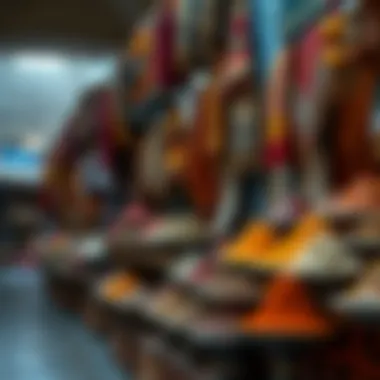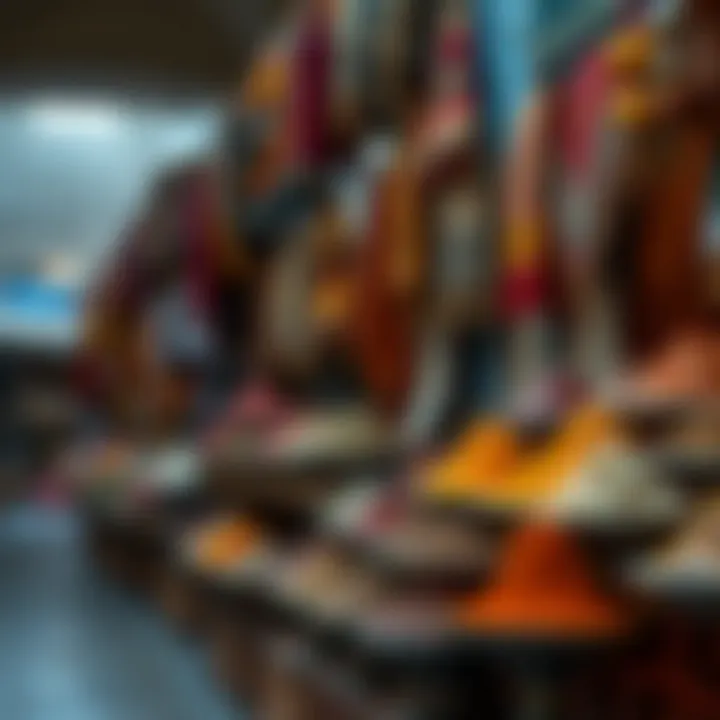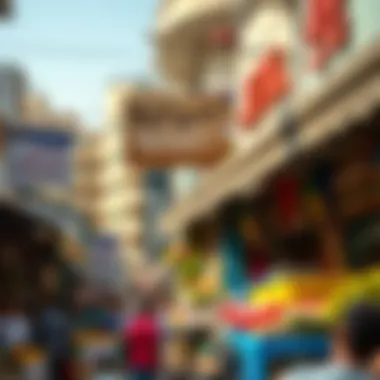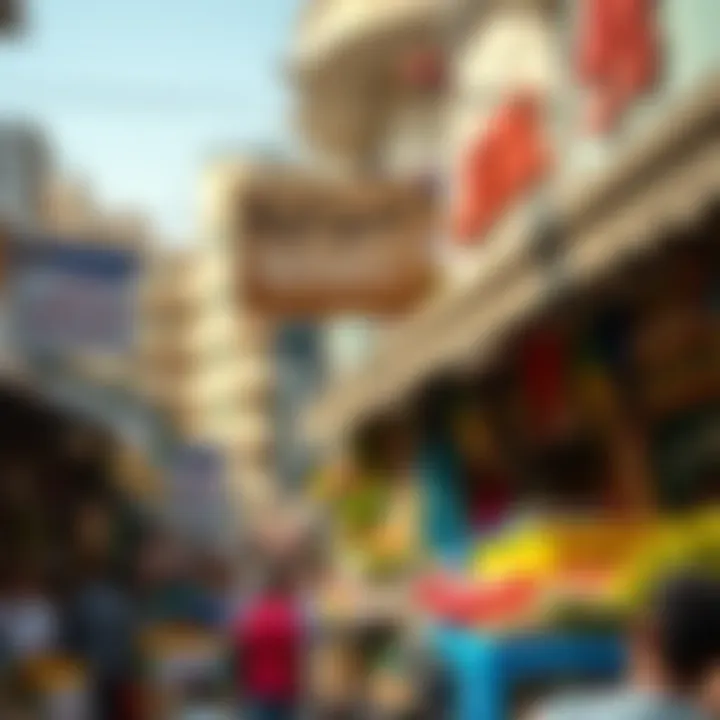Discover the Vibrant Markets of Dubai


Intro
Dubai’s marketplace is more than just a collection of shops; it’s a physically and culturally vibrant hub. Spanning from bustling traditional souks to sleek, high-end malls, these markets embody the spirit of a city that embraces both heritage and modernity. This journey through Dubai’s markets will not only showcase the diversity and charm they hold but will also present insights valuable for investors, expats, and residents.
Understanding these markets is crucial for anyone looking to navigate Dubai’s real estate landscape. Each market presents unique characteristics that influence property investment decisions. As we delve into this exploration, our focus will be on not just the aesthetic appeal of these areas but also their functional importance in the broader framework of Dubai’s economy.
Market Trends
Current Market Analysis
In recent years, Dubai has seen a shift in consumer behavior, evident in its marketplaces. Traditional souks like the Gold Souk and Spice Souk have seen evolving demographics, attracting not only tourists but locals who appreciate the unique offerings. On the other hand, the likes of The Dubai Mall and Mall of the Emirates cater to an expat community seeking a more global shopping experience.
"The mix of traditional and modern markets reflects Dubai's blend of its rich history and futuristic aspirations."
The growing population of expats has resulted in an increasing demand for varied retail experiences. Mobile apps, digital receipts, and loyalty programs are becoming standard practice, rendering markets more accessible. Retailers are adopting enhanced technology to offer seamless shopping experiences. This shift has revitalized market areas, promoting local brands while attracting international retailers, making them key points for potential investment.
Future Predictions
Looking ahead, the expectation is for Dubai’s markets to continue evolving. With mega events like Expo 2020 serving as a catalyst for growth, the landscape is poised to change significantly. Predictions indicate that more sustainable practices will find their way into marketplaces, aligning with global green standards. Additionally, the rise of e-commerce hasn’t overshadowed physical retail; instead, a hybrid model is likely to thrive where online and in-store shopping coexist harmoniously.
Expect to see emerging trends that focus on personalized shopping experiences. Marketplaces might introduce augmented reality applications to enhance customer interactions. Potential investors should keep a keen eye on these developments, as they could dictate the future value and viability of properties in proximity to these market areas.
Property Investment Insights
This section aims to equip prospective investors with information on what they can expect from the property market surrounding Dubai’s renowned marketplaces.
Types of Investment Properties
Investing in property near these marketplaces can take many forms. Options range from retail units in modern malls to residential properties in close vicinity of traditional souks. Here are a few types of properties to consider:
- Commercial Spaces: Given the footfall in busy markets, investing in commercial real estate can yield lucrative returns.
- Residential Developments: Properties in these lively areas are increasingly attractive to tenants, especially expats seeking convenience.
- Mixed-Use Properties: With evolving lifestyles, properties that combine retail and living spaces are in high demand.
Financing Options and Tips
Investing in real estate in Dubai, especially near markets, presents certain challenges and opportunities.
- Local Banks and Financial Institutions: Several financial entities offer mortgage products specifically for expats, making it easier to fund property purchases.
- Payment Plans: Many developers introduce flexible payment plans. Understand the terms and evaluate your budget before committing.
- Research and Network: Connecting with local real estate agents who have expertise in market trends can provide invaluable insights.
In summary, Dubai's markets offer a blend of rich culture and profitable opportunities. Engaging with these marketplaces not only provides insights into their unique offerings but also reveals the potential for property investments and economic growth. As Dubai continues to evolve, so too will its markets, making it indispensable for investors and residents alike to stay informed.
An Overview of Dubai’s Market Landscape
Dubai’s market landscape is a unique blend of tradition and modernity, offering a dynamic atmosphere for both consumers and investors. This region showcases not just what people can buy or sell but also reflects the broader patterns of culture, history, and economy. Analyzing this landscape gives valuable insights into how Dubai positions itself as a global hub, attracting both local and international business. Whether it’s the bustling souks that tell tales of yore or the sleek shopping malls representing cutting-edge innovation, every segment plays a critical role in creating this extraordinary market environment.
Historical Context
Understanding the historical context of Dubai’s markets is crucial. The city was once a modest trading port, where pearls and spices drove the economy. The discovery of oil in the 20th century transformed Dubai, injecting wealth and paving the way for rapid growth. As the city evolved, so did its markets, morphing from small bazaars into sprawling commercial districts and high-end malls. The blend of these historical footprints with contemporary commercial practices enriches the shopping experience and makes it more appealing to tourists and locals alike.
Cultural Significance
Dubai’s markets are not merely places of commerce; they are vibrant centers of cultural exchange. The souks, in particular, embody the essence of Emirati heritage. The Gold Souk, for instance, is not just about jewelry; it symbolizes craftsmanship and artistry passed down through generations. Similarly, the Spice Souk is a sensory delight that immerses visitors in the scents and flavors that reflect the region's rich culinary traditions. Understanding this cultural significance allows investors to appreciate the values and sentiments attached to each marketplace. It also aids in recognizing potential opportunities that align with both modern and traditional tastes.
Economic Impact
The economic impact of Dubai’s markets cannot be understated; they form a backbone for employment, tourism, and real estate. With the retail sector being a significant contributor to the emirate’s GDP, markets drive spending and stimulate the economy. Additionally, the influx of tourists seeking authentic experiences in traditional souks alongside luxury shopping in modern malls reinforces Dubai’s position as a global commerce leader. For investors, knowing the economic trends tied to these markets can steer decision-making towards sustainable investment opportunities and long-term growth.
"Dubai’s unique market landscape combines rich history with cutting-edge modernity, making it an enticing destination for commerce and culture alike."
Overall, the exploration of Dubai’s diverse market landscape reveals a rich tapestry where historical depth meets contemporary business. This understanding equips potential investors, expats, and entrepreneurs with the tools to navigate the vibrancy of Dubai. By recognizing the intertwined nature of these marketplaces, stakeholders can make informed decisions that enhance their dealings in this dynamic environment.
Traditional Markets: A Glimpse into Heritage
Traditional markets in Dubai are not just places to shop; they are alive with the history and diversity of the region. Offering a tangible connection to the past, these souks offer unique insights into Dubai's culture while also serving as significant economic hubs. For those looking to invest, these markets provide distinctive opportunities that blend heritage with commercial potential.
Dubai Gold Souk
Overview and History
The Dubai Gold Souk holds a glittering reputation that attracts both tourists and investors alike. Established in the 1940s, it continues to be a focal point for gold traders in the Middle East. The souk boasts over 300 retailers, all gleaming with countless gold items, from intricate jewelry to raw gold bars. The key characteristic that sets this market apart is its vast selection of gold, with prices often lower than those found in western markets due to a lack of taxes.
Additionally, the unique feature of the Gold Souk is the traditional bargaining process. Negotiating prices is a common practice here, which adds a layer of excitement. However, the fluctuating market prices can be a disadvantage, as buyers need to be well-informed about gold rates to ensure fair deals.
Investment Potential
From an investment perspective, the Dubai Gold Souk stands as one of the most resilient marketplaces. Gold is considered a safe-haven asset, meaning that its value tends to hold up despite market fluctuations. The Gold Souk benefits from high foot traffic, translating to consistent sales for retailers.
Moreover, the potential for growth in the gold market is promising, especially as wealth continues to rise in the region. Gold trading provides not just a means for investment but an avenue for substantial income potential for traders. The downside is, though, that geopolitical tensions and shifts in global economic conditions can impact prices significantly.
Visitor Experience


A stroll through the Dubai Gold Souk is an unforgettable experience. The air is perfumed with the shimmer of gold and the chatter of eager traders. Most vendors are welcoming, often offering traditional Arabic coffee or sweets to visitors. The charmingly chaotic atmosphere makes it a not-to-be-missed destination for experiences that dash across cultures.
However, the sheer volume of options can be overwhelming for novice buyers. First-time visitors might find it daunting to navigate the maze-like alleys and make informed decisions without prior knowledge about the prices. Therefore, it's advisable for visitors to do some research ahead of time.
Dubai Spice Souk
Product Range
The Dubai Spice Souk is a sensory delight filled with vibrant colors and exotic aromas. Here, you can find an extensive array of spices, herbs, and local delicacies. The unique feature of this market is the vast product range—everything from saffron to dried fruits and nuts is available.
For culinary enthusiasts, this expansive variety provides an opportunity to discover authentic flavors that can't be found in standard grocery stores. Moreover, the opportunity to purchase spices in bulk often allows for better pricing, making it a popular choice for both locals and visitors. Yet, the downside is that quality can vary between stalls, requiring customers to be discerning.
Cultural Experience
The cultural ambiance of the Dubai Spice Souk serves as a microcosm of the city's diverse heritage. Walking through the market offers an engaging journey through time, showcasing the role spices played in shaping trade routes and culinary practices throughout history. Vendors often share stories about their products, emphasizing their significance.
This cultural richness makes the Spice Souk a fascinating choice for those who are eager to learn more about local traditions. However, navigating through the market might be a challenge if one is unaccustomed to crowded places.
Real Estate Opportunities
The vicinity of the spice souk provides a unique opportunity for potential real estate investors. Nearby commercial properties are often in demand due to the continuous foot traffic from tourists and locals alike. Investments in retail spaces can yield profitable returns, given the constant influx of customers seeking spices and local products.
The neighborhood's evolving landscape indicates potential growth and increased property values over time. However, the fluctuating demand can sometimes lead to uncertainty, making it essential for investors to conduct thorough market analysis before committing.
Textile Souk
Market Layout
The Textile Souk presents an intricate layout that showcases the best of Dubai's fabric culture. Unlike more conventional shopping scenarios, the souk's labyrinthine structure allows for exploration and discovery of unique textiles from around the region.
The key characteristic of this layout is the warmth of the shopkeepers, who are often eager to share the stories of their goods. This interactive experience enhances the shopping process, as visitors can learn about the meanings behind different fabrics and styles. However, the layout can also lead to confusion, making it hard for unprepared visitors to navigate.
Local Artistry
Home to a plethora of local artisans, the Textile Souk celebrates craftsmanship through vibrant, hand-made fabrics. Products range from stunning silk to intricate embroidery that reflects local artistic traditions. Engaging with artisans can provide fascinating insights into their creation process, showcasing the importance of local artistry.
However, handmade items may come at a premium compared to mass-produced alternatives, which could deter budget-conscious buyers. That said, the unique quality often justifies the price.
Renting Commercial Spaces
For those considering renting commercial spaces in or near the Textile Souk, the opportunities are promising. Given the popularity of the market among tourists, establishing a shop here can tap into a ready customer base. What’s particularly advantageous are the connections to local craftspeople, allowing for collaborative ventures.
However, potential renters must be cautious of the competitive landscape, as numerous shops vie for customer attention. A well-thought-out approach can enhance one’s chances of success in this bustling marketplace.
Modern Shopping Centers: The New Urban Culture
Dubai’s retail scene has undergone a remarkable transformation over the past few decades. No longer are the bustling souks the only places where locals and tourists go to shop; modern shopping centers have become cultural phenomena that redefine consumer experiences and embody the essence of luxury and innovation.
These shopping centers serve as more than just commercial spaces—they are social hubs, entertainment destinations, and pivotal parts of the economy. The design and amenities of these venues reflect advanced architectural standards, integrating amenities that enhance the shopping experience. This offers valuable insights into how real estate development is intertwined with consumer habits, appealing to investors looking for opportunities in a rapidly evolving market.
Dubai Mall
Retail Experience
The Dubai Mall sets the standard for retail experiences worldwide. With over 1,200 shops, it showcases an impressive mix of high-end labels and popular brands. This eclectic shopping environment attracts millions every year, making it a hot spot for both tourists and residents. The sheer scale of the mall, paired with an atmosphere that melds luxury with accessibility, encourages a social shopping experience, where consumers can spend hours browsing and mingling.
One unique feature of the retail experience here is the integration of leisure activities within the shopping environment. From ice skating to virtual reality parks, shoppers are not simply buying products; they are engaging in a lifestyle. However, this unique offering also means the mall can easily become overcrowded, which may detract from the experience for some visitors.
Luxury Brands
The allure of luxury brands at Dubai Mall cannot be understated. It houses flagship boutiques from renowned names like Gucci, Chanel, and Louis Vuitton. This concentration of high-end retailers illustrates Dubai’s positioning as a global luxury shopping destination. For investors, luxury brands represent a solid investment opportunity as they continue attracting affluent customers.
However, the defining characteristic of such a brand-centric approach is that it may alienate budget-conscious shoppers. The exclusive nature of these luxury offerings may limit foot traffic during peak times, which is a consideration for businesses operating within the mall.
Real Estate Considerations
Investing in real estate around the Dubai Mall offers intriguing possibilities. The surrounding area has seen substantial property development, resulting in significant appreciation in property values. Properties near major attractions often have higher rental yields and lower vacancy rates, making them desirable for investors.
Yet, the high-profile nature of the area can also drive up costs, impacting overall yields. Those looking into real estate in this vicinity should weigh the long-term prospects against current market prices. Additionally, the demand for residential and commercial spaces remains robust due to the mall's consistent influx of visitors.
Mall of the Emirates
Diverse Offerings
Mall of the Emirates is another cornerstone of Dubai’s modern retail culture. It boasts a variety of shops, from international brands to local designers, creating a diverse shopping ecosystem. This diversity encourages both local patronage and tourist visits. The mall's ability to cater to varying tastes ensures its ongoing popularity.
A unique feature here is the indoor ski slope, Ski Dubai, which attracts not just shoppers but thrill-seekers and families. However, catering to such a broad range of consumers can create operational challenges, particularly in maintaining inventory across diverse categories.
Tourist Attractions


The presence of tourist attractions like Ski Dubai elevates the Mall of the Emirates beyond a typical shopping venue. Visitors seeking unique experiences are lured not just by the shopping but also by entertainment options, dining, and cultural events. This makes it a vital player in Dubai's tourism sector.
Nevertheless, the ease of access and variety offered may lead to seasonal fluctuations in visitor numbers, especially when travel patterns change. Consequently, operational and marketing strategies need flexibility to adapt to these dynamics.
Investment Viability
From an investment viability perspective, properties around the Mall of the Emirates are often in high demand. The mall's established reputation boosts confidence among investors, making real estate here a valuable asset. Additionally, the supportive infrastructure of the area, including public transport links, enhances its appeal for both commercial and residential investment.
However, potential investors should conduct thorough market analysis, as trends can shift rapidly in bustling retail environments. Comparative studies with similar locations may yield the needed insights before making decisions.
Ibn Battuta Mall
Thematic Architecture
Ibn Battuta Mall distinguishes itself with its unique thematic architecture, inspired by the travels of the great explorer Ibn Battuta. Each section of the mall reflects different cultures and regions he visited, offering a shopping experience that is both engaging and educational. This distinctive characteristic attracts visitors who appreciate not just shopping but also cultural immersion.
The mall's ambiance is inviting and playful, but some might argue that such a strong thematic focus could limit the mall's appeal compared to more conventional shopping centers.
Visitor Demographics
Understanding the visitor demographics is crucial, as Ibn Battuta Mall attracts a diverse range of people—from families to tourists and locals. This mix enhances foot traffic and provides opportunities for businesses that cater to different needs. Families often enjoy the mall's spacious layout and child-friendly features, while tourists appreciate the cultural themes.
However, the broad demographic can also mean varied expectations, making it important for businesses to carefully consider their offerings and marketing strategies.
Market Opportunities
Finally, amid the unique offerings of the Ibn Battuta Mall lies a wealth of market opportunities for retailers and investors alike. The cultural storytelling woven into the shopping experience presents an appealing backdrop for niche brands. Additionally, the mall’s focus on diversity could enhance acceptance for local businesses trying to enter the competitive retail market in Dubai.
Yet, competition is fierce, and potential businesses must have a well-defined strategy to stand out amidst the cultural tapestry. Market research remains essential in understanding consumer preferences and aligning offerings accordingly.
Modern shopping centers are not just places to transact; they are cultural landmarks that reflect the evolving dynamics of urban life.
In summation, Dubai's modern shopping centers play an integral role in shaping consumer behavior and defining urban culture. As the landscape continues to evolve, investors and businesses must stay attuned to these shifts, aligning their strategies to harness the potential these dynamic venues offer.
Recommended Reading:
Integrating the latest trends and understanding local tastes will ensure a strategic advantage for those looking to thrive in the vibrant marketplace of Dubai.
Emerging Markets: A Shift in Dynamics
The landscape of Dubai’s marketplace is not just rooted in its rich history but is continuously evolving, reflecting the changing tides of commerce. Emerging markets are particularly crucial to understanding this dynamic shift. They represent not just a newer segment of the economy, but also an evolution in consumer behavior and investment patterns. The emergence of areas like Dubai Marina and Business Bay signifies more than expansion; it’s a transformation of retail and real estate strategies, catering to a diverse population looking for modern, vibrant experiences.
Investors and stakeholders should pay particular attention to these emerging markets because they offer unique opportunities for growth. The shifting demographics and the rise of urban living trends underline the need for robust infrastructure and catering to lifestyle demands. In essence, emerging markets embody the aspirations and innovations that define Dubai’s future.
Dubai Marina Market
Trends and Rentals
The Dubai Marina Market has shown a remarkable trend in the rental space, with high demand for contemporary residences that offer a blend of luxury and lifestyle. This area has become synonymous with upscale living and dynamic waterfront experiences. Not only does the market offer a variety of options for renters, including modern apartments with stunning views, but it also attracts a mix of affluent families and young professionals, each seeking to experience the city's vibrant nightlife and amenities.
The high rental yields in this area make it an attractive choice for investors looking to capitalize on the growing urban population. Rentals have fluctuated based on market demands, but a consistent trend has emerged: properties located closer to the waterfront or with exceptional amenities tend to command premium prices. Moreover, the availability of short-term rentals has opened new avenues for income generation in this thriving locale.
Demographic Insights
Understanding the demographics of the Dubai Marina Market adds another layer to exploring its appeal. The neighborhood attracts a mix of expatriates, tourists, and locals, fostering a vibrant community atmosphere. With a significant percentage of residents under 40, the market reflects a new generation's preference for urban living, social spaces, and convenience.
These insights are crucial as they inform investors about potential gaps in the market and highlight the types of properties that could be improved or introduced to cater to an evolving demographic. Additionally, the influx of professionals due to business hubs nearby increases demand for rental properties, solidifying the area's appeal as a lucrative investment opportunity.
Potential for Growth
Growth potential in the Dubai Marina Market is perhaps one of its most attractive characteristics. With ongoing development plans focused on sustainability and improved urban infrastructure, this area is poised for continuous appreciation in property value. The Marina is also benefiting from the expansion of public transport links and the enhancement of community spaces, making it increasingly accessible.
The increasing popularity of lifestyle-based amenities, such as dining, shopping, and recreational options, caters to the desire for more holistic living environments. Investors can expect that as more developments materialize, the market will thrive, fueling demand and further driving rental yields.
Jumeirah Beach Residence
Market Overview
Jumeirah Beach Residence (JBR) is a gem in Dubai’s real estate crown, known for its luxurious residences and proximity to leisure destinations. The area offers a relaxed coastal vibe with a bustling atmosphere, attracting everything from tourists to long-term residents. Its market is characterized by a mix of high-end apartments and exclusive villas, which contribute to its reputation as a premier living destination.
The uniqueness of JBR lies in its dual appeal: it’s not just a residential area but also a lifestyle attraction with its beachfront promenade lined with shops and dining options. This integration of living and leisure creates significant appeal for investors looking for robust investment opportunities in tourist-heavy locales.
Residential Demand
The residential demand in JBR can be attributed to its strategic location and high-quality amenities. As one of the most sought-after areas in Dubai, properties here enjoy a steady influx of tenants willing to pay a premium. Families, professionals, and even retirees are drawn to its waterfront lifestyle and community feel.
However, the market does face challenges such as seasonal fluctuations, where demand might dip in the hotter months. Nevertheless, investments tend to appreciate in the long term due to consistent demand for its unique offerings, making it a relatively safe bet for property investors.


Investment Trends
Current investment trends show a marked interest in property developments that blend residential and commercial uses within JBR. Investors favor properties that offer higher rental yields, particularly those that can accommodate a short-term rental strategy. The push towards bringing more family-friendly amenities into the area reflects the changing demographics and lifestyle choices of residents.
In addition, developers are increasingly focusing on sustainability and innovative design features, which align with global trends and consumer preferences. These factors make JBR not just an investment hotspot but also a cornerstone of modern Dubai living.
Business Bay
Commercial Properties
Business Bay is a vibrant commercial district that illustrates Dubai's ambition to become a leading global business hub. It features a mix of high-rise office buildings, retail outlets, and luxury hotels. The accessibility from various parts of the city enhances its attractiveness for businesses and investors alike.
Commercial properties here range from high-end office spaces to vibrant retail units. Developers continue to invest in creating modern facilities that cater to the needs of diverse businesses, making the area a focal point for startup culture and multinational corporations. The unique flow of professionals into this area greatly supports the commercial property market.
Market Stability
When it comes to market stability, Business Bay stands out as a resilient area in the face of economic fluctuations. Its strategic importance within the city and continued growth in infrastructure contribute to this stability. Unlike some other areas, which may experience sharp fluctuations, Business Bay has preserved its value, making it a secure option for long-term investors.
Additionally, ongoing government initiatives aimed at enhancing the business landscape have elevated market stability, signaling to investors that the area’s growth will continue robustly.
Future Prospects
Future prospects for Business Bay remain bright. With new projects being announced regularly, including mixed-use developments that combine commercial, residential, and leisure spaces, the area is expected to see a surge in interest. These developments often aim to introduce international standards of style and functionality, appealing to both businesses and investors.
Investors can anticipate an array of upcoming opportunities, whether it’s office space tailored for startups or retail spaces designed for established brands. The blend of luxury and utility underscores Business Bay's status as a forward-thinking economic zone in Dubai's vast economic landscape.
Market Trends and Insights
Understanding market trends and insights in Dubai is critical for anyone looking to invest or engage in its dynamic marketplace. The rapid growth of both traditional and modern markets presents a unique opportunity for investors, expats, and business owners alike. This section dissects consumer behavior, investment patterns, and future projections, enabling readers to make well-informed decisions.
Consumer Behavior
The purchasing habits of consumers in Dubai have evolved significantly over the years. With a diverse population representing various cultures, the preferences and expectations from the market tend to shift. Notably, expatriates make up a considerable portion of the market, influencing trends in demand for specific products and services. For instance, many expats lean towards international brands and unique items that reflect their cultural backgrounds.
Moreover, the rise of online shopping has altered consumer engagement. Shoppers today have access to a myriad of online platforms, making convenience a top priority. Malls are no longer just a place to shop; they now serve as experiential spaces, where customers seek entertainment and social interaction along with their purchases.
In essence, being attuned to these shifts in consumer behavior means businesses can adjust their offerings and marketing strategies accordingly. Understanding local preferences and tapping into emerging interests can make all the difference.
Investment Patterns
Investment in Dubai's markets has shown a notable trend toward a preference for mixed-use developments. Investors are now keen on projects that offer both commercial and residential opportunities, catering to a lifestyle-oriented demographic. Areas like Dubai Marina and Business Bay have attracted attention for their blend of living spaces and entrepreneurial hubs.
Interestingly, many investors are now looking beyond the high-profile mega-malls. Lesser-known but burgeoning markets are gaining traction due to their unique offerings and potential for growth. For example, souks that have historically been overshadowed by modern malls are seeing renewed interest as they embody contrasting authentic experiences.
Additionally, investors are increasingly considering sustainability and social responsibility as essential factors. They are drawn to developments that incorporate eco-friendly practices and community-focused designs. This shift reflects a general global trend that resonates particularly well with investors in Dubai.
Future Projections
As the market continues to flourish, future projections for Dubai's retail environment appear optimistic. Analysts suggest that the ongoing integration of technology in shopping experiences will further enhance consumer engagement. Virtual reality, AI-assisted shopping, and contactless payment solutions are among innovations on the horizon, aiming to streamline purchasing processes.
Furthermore, as tourism continues to rebound post-pandemic, the demand for unique shopping experiences is expected to grow. Emerging trends indicate a shift towards localized products that showcase craftsmanship. Investors and retailers could benefit by tapping into this particular niche, promoting locally-sourced goods that appeal to both tourists and residents.
"Staying ahead of market trends is vital for achieving long-term success in the competitive Dubai landscape. Those who adapt to the changing dynamics will reap the rewards."
Practical Considerations for Investors
Understanding the intricacies of Dubai's marketplaces is crucial for anyone considering investment in this vibrant city. The local markets present a unique combination of rich cultural heritage and contemporary business opportunities. Investors must navigate various elements to maximize their potential returns and minimize risks. This section highlights the importance of understanding rental yields, navigating local regulations, and evaluating market risks, which are all vital components in making astute investment decisions.
Understanding Rental Yields
Rental yields serve as a critical indicator of an investment’s profitability. In Dubai, the rental market has been known to produce attractive yields compared to many other global cities. The rates often fluctuate based on location, property condition, and market dynamics. For example, areas like Dubai Marina and Downtown Dubai have historically shown higher yields due to their prime location and high demand.
Consider the following key points:
- Market Research: Knowing which areas yield the best returns can help direct capital more effectively. Engaging with local real estate agents can provide insights at a micro-level.
- Property Type: Different types of properties yield different returns. Residential apartments, luxurious villas, or commercial spaces all vary significantly in their yield percentages.
- Seasonality: Rental demand can be seasonal, with peak times often around major events or exhibitions. Understanding this can help in timing investments better.
Maximizing rental yield doesn’t always hinge on location alone. Property management, maintenance, and tenant acquisition strategies can all play a significant role in both retaining value and enhancing returns.
Navigating Local Regulations
Getting a firm grasp of local regulations is equally paramount for investors. Dubai's real estate landscape is governed by a diverse set of laws that affect both property ownership and rental agreements. For instance, the laws relating to foreign ownership can be complex, varying by area and property type.
Here's what to keep in mind:
- Types of Ownership: Foreigners can only own property in designated areas. Understanding these limitations is crucial for any investment strategy.
- Rental Laws: Familiarizing yourself with Dubai's rental laws can save from potential legal disputes. Landlords must follow specific protocols for evicting tenants and must be aware of market rent limits to avoid penalties.
- Licensing: Ensure that any property management services are properly licensed. This tends to be overlooked but is essential for lawful operation.
Consulting a local legal expert familiar with UAE law can also provide additional clarity and safeguard your investment.
Evaluating Market Risks
As with any investment, understanding and evaluating risks is essential. Dubai’s real estate market has shown great growth, but it has also experienced volatility. Factors affecting market stability include economic trends, geopolitical influences, and market saturation.
Key risk considerations include:
- Economic Dependency: Being largely reliant on oil revenues has historically posed risks to the UAE economy. Investors should watch for economic diversification initiatives that impact property values.
- Market Competition: In a city known for rapid development, new projects popping up can dilute property value over time. Keeping tabs on upcoming construction can help gauge potential impacts.
- Market Sentiment: Investor sentiment globally can shift rapidly, especially in response to geopolitical events. Understanding global trends can provide additional foresight in demand fluctuations.











